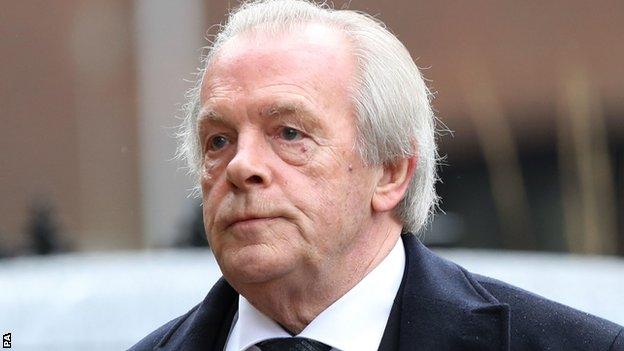Gordon Taylor defends PFA dementia research funding
- Published

Taylor agreed to join the Football League as chief executive in 1989 before reconsidering and staying with the PFA
Gordon Taylor has defended the £125,000 the Professional Footballers' Association allocates to dementia research each year.
However, the 74-year-old regrets not being able to make more inroads with research into the issue.
"We were the first to introduce heart screening for players," said Taylor, who will leave as PFA chief executive after 38 years.
"We've done research into arthritis. We've begun research into dementia."
The PFA has been criticised in several quarters for not acting quickly enough over the issues surrounding football and dementia, with Dawn Astle - the daughter of former West Brom and England striker Jeff Astle who died in 2002 from a brain trauma - walking out of a meeting with Taylor.
"You're talking about a worldwide problem that government can't deal with, health services can't deal with and Fifa hasn't dealt with," Taylor told BBC Radio Four.
"But we've lead the way on that. I'm lobbying for that. We are now involved in some four areas of research to see if there can be a causal link [between football and dementia]."
He added: "I'm not perfect and it would be lovely if we'd been successful with research, and that would create big changes in the game.
"But it's not just heading - it's arthritis, it's lots of issues in regards to health and safety."
What about Taylor's salary?
Taylor, who had spells at Bolton, Birmingham, Blackburn Rovers and Bury during an 18-year playing career, has led the players' union since 1981 and his departure comes after the organisation announced a "full and open review" into its finances.
He has been criticised for the salary he gets paid, with PFA general fund accounts for 2017-18 showing his remuneration came to a total of £2,020,393.
"It (salary) isn't that actually, there's a bonus," said Taylor. "I don't decide my own salary. It's looked at by a business committee and by experience."
Taylor is credited with negotiating the PFA's biggest source of income - around £25m per year from the Premier League.
"It's a matter of being appreciated. I don't write out my own wages," he said.
"It's what people think I deserve to get. Hopefully, if you look at our accounts, you look at my records, then that will be there for all to see."
Taylor will remain in his post until the review into the PFA is complete and presented at the organisation's annual general meeting.
Asked if he was sure no irregularities would be found, he said: "Well that's always the risk you would take if you're prepared to do an open and independent and objective review.
"I've got every faith in my staff and the structure that things have been accountable when we're responsible for so much more good than bad."
The PFA has also said its entire management committee and current chairman Ben Purkiss will step down.
Around 300 high-profile former and current players endorsed an open letter calling for Taylor to step down in November amid a dispute with Purkiss.
"There's definitely a difference in opinion [with Purkiss] on different matters such as eligibility etc.," said Taylor.
"But the fact is, in being professional, that when I do my negotiating my policy is always to leave the table knowing that you can meet up again and respect each other. And that's exactly the situation at the PFA."